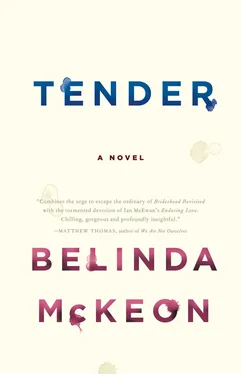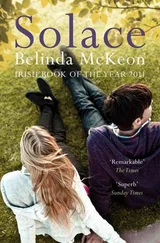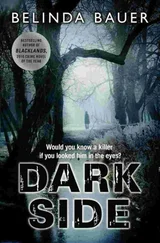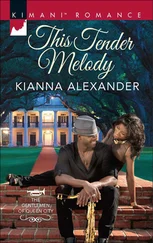“No, I am not codding you. Whatever that is. It sounds painful. Is it?”
“Sometimes,” James said, suggestively.
“Oh, for fuck’s sake,” Catherine cut in irritably. “I’m not bloody singing. I don’t have a song.”
“What’s your song?” James said to Nate, and Catherine felt a stab of jealousy at his having responded to him rather than to her.
“Well, the one Ed made me learn is not the one I’m going to sing,” Nate said. “The one I’m going to sing is a surprise for him.”
“Awww,” James nudged him.
“What are you two going to sing?”
“We don’t have songs,” Catherine said.
“Ah, no,” James said lightly. “I think I can find something.”
Catherine looked at him. “No, you can’t. What can you sing? What song do you have?”
“Catherine,” he said, laughing at her, “I have lots of songs.”
“Oh, for fuck’s sake, James, we’re not singing,” Catherine said.
“Ah, Reilly. Don’t take it all so seriously,” James said, and he pressed his forehead to hers. “Come on, darling. We can come up with something. Do it for me. Go on.”
“You could sing a duet,” Nate said, clearly enjoying the moment. “‘I Got You, Babe.’ Or ‘I Loves You, Porgy.’”
“That’s the spirit,” James said, and he put his arm around Catherine, and if it did not melt her anger completely, it confused it, this gesture; she leaned into him, glad of his touch. In a high, gleefully corny tone, he sang the first line of “Islands in the Stream.” He looked at Nate. “What’s the rest of that?” he said.
“Don’t ask me.”
“Come on, Reilly,” he said, squeezing her. “We’ll dazzle them.”
“I’m not singing,” Catherine said.
Nate got up to sing his song soon afterwards, and as soon as he started, with no preamble, just a look — a tender and, it seemed, intensely private look — at Ed, something in the room went still. He had not even finished with the first line — it was not a line that Catherine recognized, though she could tell it was another of the old Irish ballads — and it was as though the entire room of people, thirty or forty of them standing and sitting, had caught their breath and then drawn it in more deeply, a deep, slow breath of sadness and gratitude. Nate’s voice was strong and clear, and he was well able to hold a note, but that was not the reason; it was something else, she knew. Behind her, James sighed heavily, and she turned to him.
“What is it?” she whispered, tugging at him. “What is this?”
“‘My Lagan Love,’” he whispered back, his eyes locked on Nate. “Amazing.”
The Lagan; that was in Belfast, where Ed was from, and where the talks were, of course, happening tonight, and that was of course it; that was why the room had reacted that way. And listening to the lines— the night is on her hair, he was singing now, and something about lovesickness — Catherine felt herself yield to them too, felt herself becoming wistful and emotional and pleasurably, gratifyingly swollen with the momentousness of it all; that while this very song was being sung here in Dublin, history was maybe being made a couple of hundred miles to the North. What a moment this was! The Irish Times woman should write about it and put it in the next day’s paper. Although it was too late for the next day’s paper now, of course, it was almost two in the morning, but Saturday’s edition, maybe with a description of the dazzling people who had been at the party, Catherine and James named among them—
Across the room, Ed was watching Nate with tears falling, shining on his cheeks. Her arm moved, to nudge James, but she found that she could not do this — that she did not want to, she realized, in the next moment. She did not want him to see Ed there, crying, as his lover— lover, she heard in the voice of Julia Doonan, who was sitting close to Ed, looking as though she might cry as well — sang the song that he had learned for him as a surprise, as a gift.
For love is lord of all, Nate sang.
And afterwards, they cheered him to the skies.
“Holy shit,” James kept saying, clapping, clapping harder and harder. His eyes were damp too, Catherine saw, feeling dizzily, unhappily anxious at the sight of them, even though her own eyes were the same. “Holy shit,” he said, then shouting it: “Holy shit!”
But that was still early. Comparatively, that was still early. And later was later, and booze was everywhere, booze was in the very veins of the house, and an hour later, maybe two, there were not thirty people at the party but maybe fifteen, and they had all sung. And James had sung — a song Catherine could not now remember, because Catherine was drunk, very drunk, and Catherine was sitting on James’s knee, and Nate had sung again, the song he had pretended to Ed to have learned, and Ed had sung, a song called “Peggy Gordon,” and Mick Doonan had sung, even, and the woman from the Irish Times had sung some kind of gospel song, and had wanted people to clap along and nobody had clapped, or maybe they had, or maybe some of them had and some of them had not; and everyone, everyone, everyone had been at Catherine, had kept at Catherine, to sing. Oh, come on, love, they had said, you must have a song in you, and Nate had said it and Michael and Julia Doonan had said it, and Ed had said it, and James had said it, and Catherine had resisted, because she did not have a single verse of anything, except of the pop songs which refused to leave the very molecular structure of her brain. Why did she retain that rubbish, and nothing worth knowing? All those suitable songs she had been forced to learn in school — where on earth had they gone?
“Come on,” Nate said to her again; he was crouching by James’s knee, now, for some reason. He was prodding at James’s knee, as though it was going to prompt Catherine to sing. “You two kids,” he said, almost fondly; but was it fondly? Or was it mockingly? “What are we going to do with you?”
“Do whatever you want with us,” James said from behind her, and he squeezed Catherine, saying whatever it was he was trying to say to her; what was he trying to say to her?
“What?” she hissed, wanting, suddenly, a translation, but not about to get one; she knew this in the moment that she twisted around to James and saw that he was grinning not at her but at Nate.
“I liked yours,” James said, and Nate gave a little bow, which caused him, because he was crouching, almost to topple over, and this made the three of them laugh, but James laughed hardest of all, so much that to stay on his lap, Catherine really had to hold on to him, had to hold on to him like they were moving, like they were on a sledge or something, speeding, bouncing down a snowy hill.
“I liked yours too,” Nate said, when he had recovered, and still Catherine could not remember what it had been, James’s song; not even now, as they talked about it, he and Nate, not even now as Catherine shoved him and asked him, and maybe he was ignoring her, or maybe he was telling her and she was forgetting it again in the next instant, but she simply could not remember the name of it, that song.
And then it was five in the morning, or near enough to it, and still they were singing. Someone sang “The Parting Glass”—maybe Doonan, or Julia, trying to get rid of them, trying to drop them a hint? But nobody went anywhere, and then it was “Hard Times,” at which people were damp-eyed all over again, which just seemed indulgent, somehow, which seemed just to be wallowing in things; none of them had had their legs blown off, after all, at least not as far as Catherine, from her perch on James’s legs, could see. And Catherine was, by now, very, very drunk. And although the singing now seemed to be over for the night—“The Parting Glass” once more — still Catherine, with the encouragement of James and the even more enthusiastic encouragement of Nate — stood up by the fireplace and she sang the words of a song she had learned in school, and which she had forgotten that she still knew, and which was a song in Irish, and the words of it seemed to flow beautifully back to her, but then, all of a sudden, the words were gone from her, completely and utterly gone from her, and she realized that she did not have a clue, that she did not have this song, not anything more than the tune of it, at all, and so she made them up, the words; she made up not only the words, but the sounds of them. Because they were in Irish, and she could not, anymore, speak in Irish; who could? And who would notice? All Irish words sounded the same, once you were singing them in that low, sweet, melancholy way, after all — and she knew other Irish words, and she added other Irish-sounding words, and she wove them together, and she made them into the song. If the song had been in English, she would really not have been able to do this without sounding ridiculous, she thought, so she complimented herself, congratulated herself, as she sang, on having had the foresight, really, to have chosen this one. And she got as far as the chorus — or her version, anyway, of the chorus — and the sounds slid to a stop, and she bowed her head the way she had seen all the other singers do, and she said, Thanks, thank you, I think I’ll leave it there, and they roared — they roared in appreciation, and they roared in admiration, and they roared, it struck her a moment, as she staggered back to James and James’s lap, a horrible moment later, in hilarity — someone actually howled with laughter — had that been James? Would he do that to her? No, no, it had been someone else, someone they did not know, some fucker, some old fucker; Die, she thought. Go away and get on with just fucking dying —and someone cheered — and she loved this person, though maybe not — and someone held up their hands, clapping. And everything holds up its arms weeping, that came to her; that was a poem — Hughes, the new book. She shook it away. There was clapping, there was cheering; she needed to concentrate on the cheering. She needed to concentrate on James, on his beautiful, laughing face — no, just laughing face, that was the rule, just his laughing face — as he stood up, now, to take her in his arms — no, to hug her, just to hug her; friends hug, that was what friends did — and to laugh his kisses into her ear, into her hair, and to pull away from her, shaking his head, as though thinking of the wonder of her, of the wonderful wonder. Wonderful wonder; that was not from the Hughes. And Nate, beside her now as well, and someone shouted, Who cares about the bloody words, and Julia Doonan came over to her and said, Inspired, darling, delightful, and the room was getting back to itself, and part of Catherine felt very embarrassed about what had just happened, part of her wanted to curl up and die, but that was a part of her, she knew, that she would not have to face up to until the next day, and all that mattered was that she was here and she was now, sitting so cozily with James, bundled up on his lap; the armchair they were sitting on was in a kind of alcove, so it was as though they were hidden, protected, secreted away from the rest of the room, draped with a blanket that had come from somewhere— Love, love / I have hung our cave with roses —and as though this space, in which they were talking, was made only for them, only for their closeness, and their laughter, and the stories they had to tell each other and the things they had to discuss, and they went over everything, everything, not just the party and the stuff about Ed and Nate, but the whole evening, the opening, and how it had felt, the way they were looked at, the way they were here, the youngest, the kids, people thinking them interesting, thinking them beautiful, and wasn’t it funny, weren’t they a pair?
Читать дальше












